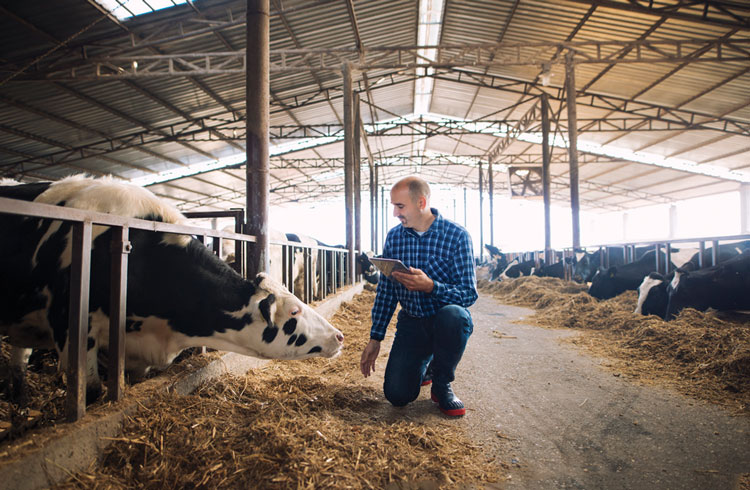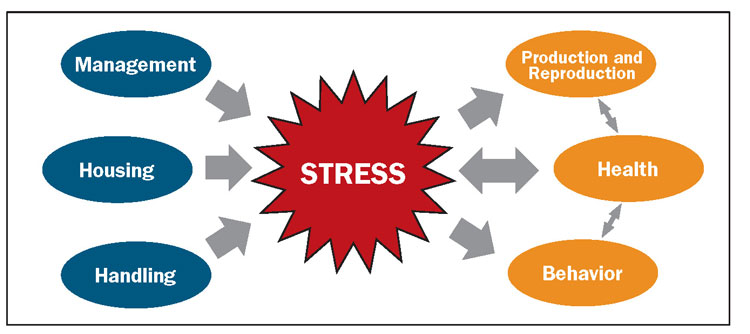
With so much attention placed on animal welfare, the perspective of farmers is often overlooked, even though they are the ones who provide care to animals daily and have the greatest impact on animal welfare.
There is growing evidence that the health and welfare of dairy cows is related to the well-being of dairy farmers. Through research done in Canada, we found that herd lameness prevalence was related to farmer stress and anxiety scores, supporting the idea that human and animal health are connected. This connection aligns with the “One Welfare” approach (related to “One Health”), which “describes the interrelationships between animal welfare, human well-being, and the physical and social environment.”
In a study from Norway, dairy farmers who felt stressed, lonely, or weary scored lower on their animal welfare indicator (an overall score looking at production, culling, and cow health). On the other hand, herds received a better animal welfare score when the farmer had greater occupational well-being (including work satisfaction, income, optimism about the future and control, and feeling appreciated as a farmer).
When considering ways to reduce stress for animals, the best way to improve animal welfare may be to also focus on improving the well-being of the farmer.
Well-being has many forms
When making decisions about how to manage your farm, your animals, and your life, too much stress can cause one to feel overwhelmed, burnt out, or panicked. On the flip side, some level of stress is inevitable and not always a bad thing because it motivates us and can enhance our productivity. Still, farming is not only laborious, but it also comes with so many uncontrollable factors, which can put producers at risk. Given that farming is incredibly stressful both physically and mentally, we want to minimize stress wherever possible.
When we think about our well-being, we usually think first of our physical health, then we may consider our mental or emotional health. On top of that, it is important to recognize our social well-being and other factors like financial, occupational, intellectual, and spiritual well-being.
Similarly, when we think about animal welfare, we think of the cows’ physical health and productivity. We should also consider their mental state and whether they are able to perform high-priority, natural behaviors.
There is more to consider than just physical health and mental health. Health is just one of the many factors that contribute to the well-being of humans and cows.
A low-stress environment
Reducing physical and social stressors is key to providing cows an environment where they can thrive and reach their potential. This flowchart helps us visualize the connections between the decisions we make, the actions we take, and the outcomes they have for people and animals on the farm.
Stress induced by management includes grouping and regrouping animals, especially for pregnant heifers and first-lactation cows since being housed with older animals can cause stress and even lead to lower production and health issues. Avoid regrouping cows more than once per week and limit stocking density in those pens. Introduce new animals in pairs instead of alone (especially when grouping heifers with older cows) or even better, create stable “all-in, all-out” dry cow pens when possible.
What we feed cows, how often, and how much access they really have to the bunk is also crucial. Finally, dry-off management is key to reducing physiological stress for cows, especially if they are high producers. To limit stress at dry-off, reduce milk yield by gradually cutting back energy intake or milking frequency in the week leading up to dry-off.

Housing can also cause physiological and social stress if rest areas are not clean, dry, and comfortable, or if cows are overstocked or heat stressed. In terms of bedding, the type, depth, and moisture content are important factors. Stress caused by overstocking can impair immune function and raise the risk of subclinical ketosis in fresh cows. Higher stocking densities have also been related to greater lameness prevalence and lower milk yield.
Heat stress not only affects immunity and causes inflammation, but it also impairs fertility and impacts future generations. The daughters and even granddaughters of pregnant cows exposed to heat stress show lower milk production and have a lower probability of survival.
Handling animals can also be a negative experience if low-stress methods are not used. On beef operations, research has demonstrated that poor handling was related to high reactivity of heifers, more undesirable behaviors and accidents, dirtier perineal regions, and lower pregnancy rates. Operations that participated in animal handling training — whether occasionally or regularly — used better handling techniques, and their cattle performed fewer undesirable behaviors during handling compared to nontrained farms, where there was also a decline in handling quality over the course of the day.
Stress affects everyone
The impacts of stress on production, reproduction, behavior, and health apply to both humans and animals. Even cows with moderate lameness and subclinical ketosis behave differently and produce less milk. Stress can be physiological or psycho-social; therefore, we must consider cows’ physical and social environments and their behavior.
Our working environment can also cause stress. In our research, we found that dairy farmers who worked mostly alone had greater anxiety and depression levels than those who worked with others. Alternatively, farmers who used automated feeders in addition to robotic milking systems had lower stress, anxiety, and depression scores compared to those feeding conventionally.
In addition to caring for their cows, farmers need to remember to take care of their own physical and mental health. It will also have positive benefits for their families and farms.







